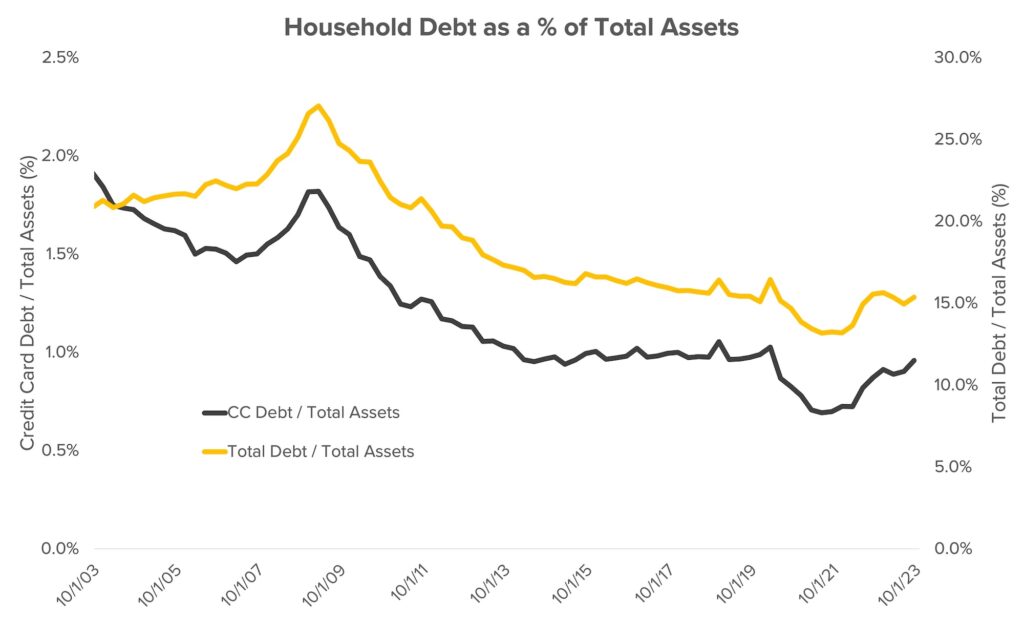Some crucial context on Americans’ “out of control” debt levels.
“Credit Card Debt Crisis”
“Credit Card Debt Hits New Record”
“Americans Are Drowning in Credit-Card Debt”
These or similar media headlines may have you fearing that consumers are being crushed by a wave of credit card debt that threatens to take down the entire U.S. economy.
If so, take a breath. We’ve got some good news.
Yes, American credit card debt levels recently surpassed $1 trillion for the first time ever—while total household debt also hit an all-time high (around $17 trillion)1. On the surface, those developments seem to warrant the media’s fearmongering.
But a closer look reveals a different perspective: Americans’ overall financial health should be strong enough to absorb and manage that debt. Compare consumers’ debt levels with their total household assets, for example, and a far more positive picture comes into focus:
- Credit card debt relative to total assets (the black line and the data on the left side of the chart below) is a mere 1%—right on par with the long-term, pre-pandemic average2 of 1.1%. Notice, too, that today’s debt-to-assets ratio is also significantly lower than 20 years ago.
- Total household debt compared to total assets (the yellow line and the data on the right side of the chart) is just 15.4% today. That’s well below the long-term average2 of 17.8%.

Moreover, 30- and 90-day credit card delinquency rates—though up from their all-time lows—are also below their long-term averages2.
The upshot: Consumers’ balance sheets and their ability to service their “out of control” debt remain strong—particularly when considering last week’s jobs report showed continued labor market resilience, and the fact that wages have grown faster than inflation since May. Does all of this mean no one will experience debt-related financial challenges in the coming months? Of course not. Rising debt and higher rates will mean trouble for some. But in aggregate, Americans don’t appear to be drowning in debt—they’re surfing on it.
1 “Household Debt and Credit Report, Q3 2023”, Federal Reserve Bank of New York.
2 2010-2019 The S&P 500 is a stock market index tracking the stock performance of 500 of the largest companies listed on stock exchanges in the United States.
This commentary is written by Horizon Investments’ asset management team. Past performance is not indicative of future results. Nothing contained herein should be construed as an offer to sell or the solicitation of an offer to buy any security. This report does not attempt to examine all the facts and circumstances that may be relevant to any company, industry, or security mentioned herein. We are not soliciting any action based on this document. It is for the general information of clients of Horizon Investments, LLC (“Horizon”). This document does not constitute a personal recommendation or take into account the particular investment objectives, financial situations, or needs of individual clients. Before acting on any analysis, advice, or recommendation in this document, clients should consider whether the security in question is suitable for their particular circumstances and, if necessary, seek professional advice. Investors may realize losses on any investments. Asset allocation cannot eliminate the risk of fluctuating prices and uncertain returns. All investing involves risk of loss. Reference to an index does not imply that any account will achieve returns, volatility, or other results similar to that index. An index’s composition may not reflect how a portfolio is constructed in relation to expected or achieved returns, portfolio guidelines, restrictions, sectors, correlations, concentrations, volatility or tracking error targets, all of which are subject to change. Individuals cannot invest directly in any index. Indices are unmanaged and do not have fees or expense charges, which would lower returns. The investments recommended by Horizon Investments are not guaranteed. There can be economic times when all investments are unfavorable and depreciate in value. Clients may lose money. This commentary is based on public information that we consider reliable, but we do not represent that it is accurate or complete, and it should not be relied on as such. Opinions expressed herein are our opinions as of the date of this document. These opinions may not be reflected in all of our strategies. We do not intend to and will not endeavor to update the information discussed in this document. No part of this document may be (i) copied, photocopied, or duplicated in any form by any means or (ii) redistributed without Horizon’s prior written consent. Forward-looking statements cannot be guaranteed. Other disclosure information is available at www.horizoninvestment.com.
Horizon Investments and the Horizon H are registered trademarks of Horizon Investments, LLC
©2023 Horizon Investments LLC
